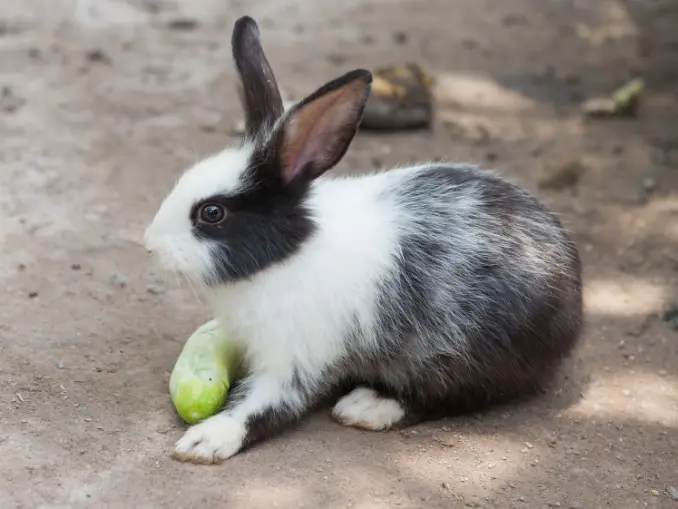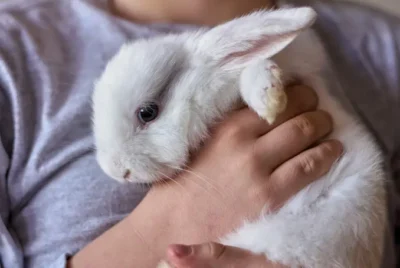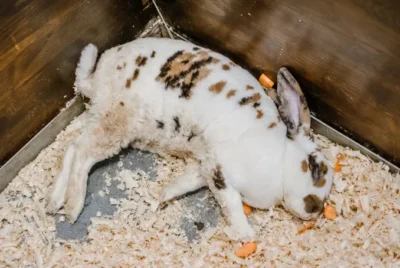Can Rabbits Eat Cucumbers? (Safe or Not)
Have you ever wondered if rabbits eat cucumbers? As a suitable snack for your furry friend, the rabbit? As rabbit owners, we want to provide the best diet possible to ensure our pet’s health and happiness.
In this blog post, I’ll explore whether rabbits can safely consume cucumbers, the nutritional value of different cucumber parts, and how cucumbers fit into a balanced rabbit diet. Let’s hop right in.
Can Rabbits Safely Consume Cucumbers?
Rabbit owners will be pleased to know that rabbits can safely consume cucumbers. Yet, moderation should not be overlooked.
Cucumbers serve as a hydrating treat and deliver vitamins C and K, along with potassium, which aids in organ functions, calcium absorption, and bone development. Nevertheless, the potential health risks linked to feeding cucumbers to rabbits warrant attention.
Feeding too much cucumber can lead to diarrhea and an upset stomach, so it’s crucial to incorporate cucumbers as part of a balanced diet and offer them in moderation.
For the health and happiness of our rabbit friends, keeping cucumber consumption to a maximum of 5% of their daily food intake is advisable.
Nutritional Value of Cucumbers
While cucumbers are not particularly nutrient-dense for rabbits, they do provide hydration, as they are mainly composed of water.
Despite lacking essential fiber and nutrients, cucumber seeds deliver vitamins and minerals like vitamin K, vitamin C, and potassium, which contribute to the enhancement of organ functions and bone health in rabbits.
On the other hand, cucumber skin is rich in fiber and offers nutrients like potassium and vitamin A.
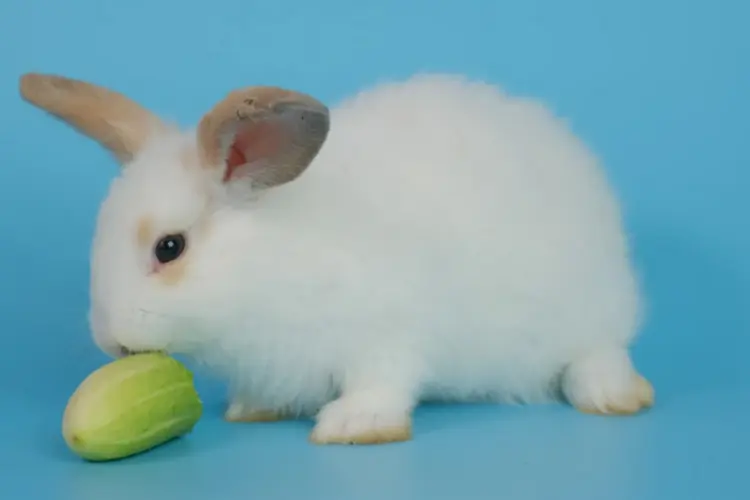
Potential Health Concerns
Feeding cucumbers to rabbits necessitates moderation. Overindulgence can trigger digestive problems like diarrhea, potentially leading to nutrient deficiency and other health complications within the rabbit’s digestive system.
Besides regulating the cucumber quantity consumed, washing and peeling cucumbers prior to feeding them to your rabbit is paramount.
This precautionary action aids in the removal of potential contaminants and bacteria that may jeopardize their health, allowing our rabbits to relish the refreshing taste of cucumbers without any harmful consequences.
Read also: Thinking of Getting a Rabbit? Here’s What You Need to Know
Feeding Guidelines: How Much and How Often?
Maintaining a balanced diet for our rabbits requires providing cucumbers in appropriate amounts and at suitable intervals. Typically, most rabbits can appreciate a thin slice of cucumber two to three times weekly.
Many rabbit owners often wonder how much cucumber their furry friends should consume. The recommended cucumber consumption for a mature rabbit is up to 1 tablespoon of cucumber for every 2lb (1kg) of bodyweight, or about 50g or 2oz of cucumber.
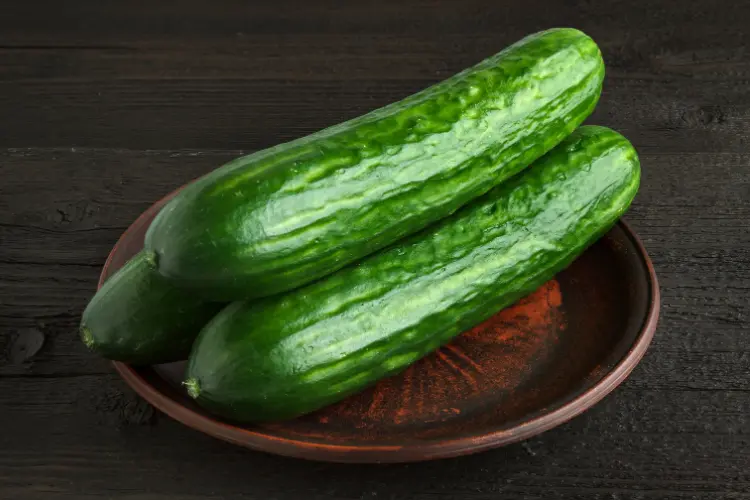
Introducing Cucumbers to Their Diet
Like any new food, cucumbers should be gradually introduced into your rabbit’s diet. Begin with a small slice and watch your rabbit’s reaction to this novel treat.
Adopting a cautious approach lets you confirm that your rabbit is digesting the cucumber without any issues and assists you in identifying any potential digestive discomfort.
If your rabbit’s stool remains unchanged after consuming cucumber, you can safely increase the amount given. Remember to continue monitoring your rabbit’s reaction and consult a veterinarian if you notice any worrisome behaviors or digestive issues.
Monitoring Your Rabbit’s Reaction
Monitoring your rabbit’s reaction to cucumber is crucial for their health and wellbeing. Indicators of a healthy rabbit encompass:
Bright and clear eyes
Dry and clean ears
A clean and dry nose
Robust teeth and mouth
Well-groomed fur devoid of shedding, scabs, or dandruff
An energetic and lively demeanor
Any changes in your rabbit’s stool, appetite, or overall demeanor could indicate intolerance to cucumbers. If you observe any digestive distress or changes in their behavior, stop offering cucumbers and seek advice from a veterinarian.
Different Parts of the Cucumber: Seeds, Skin, and Leaves
Rabbits can safely ingest various components of the cucumber, including the seeds, skin, and leaves, with each part offering distinct nutritional benefits and potential drawbacks. We should examine the cucumber’s constituents closely to comprehend their function in a rabbit’s diet better.
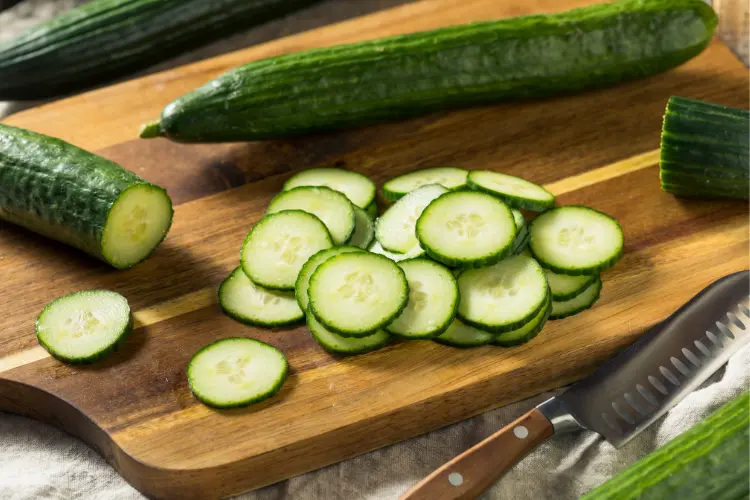
Cucumber Seeds
Cucumber seeds are soft, nutritious, and not a choking hazard for rabbits. They contain vitamins and minerals, such as vitamin K, vitamin C, and potassium, which can benefit rabbits by enhancing their organ functions and bone health.
Overall, it is safe for rabbits to eat cucumber seeds without any potential harmful effects, as rabbits eat cucumber seeds without any issues.
Cucumber Skin
Cucumber skin is rich in fiber and contains nutrients like potassium and vitamin A, making it a nourishing treat for rabbits. However, it’s essential to wash and peel cucumbers before feeding them to your rabbit to remove potential contaminants and bacteria.
By taking these precautions, we can ensure that rabbits eat cucumber skin, providing them with the nutritional benefits of cucumber skin without any risks, and they can safely eat cucumber skin.
Cucumber Leaves
Cucumber leaves are safe for rabbits but should be fed in moderation as excessive consumption can cause kidney damage. Low in oxalic acid and high in fiber, vitamins, and minerals, cucumber leaves are a nutritionally beneficial option for rabbits.
So, feel free to include cucumber leaves as part of your rabbit’s varied diet, as rabbits eat cucumber leaves, but remember to do so in moderation.
Age Considerations: Can Baby Rabbits Eat Cucumbers?
It is important to acknowledge that the dietary needs of baby rabbits differ from adult rabbits. Baby rabbits should abstain from cucumbers as their diet should primarily compose of milk, water, and alfalfa hay or pellets.
As your rabbit grows and consumes solid foods, you may wonder if baby rabbits eat cucumber. You can gradually introduce cucumbers as a treat, ensuring that they’re well-tolerated and enjoyed by rabbits, as rabbits eat cucumber too.
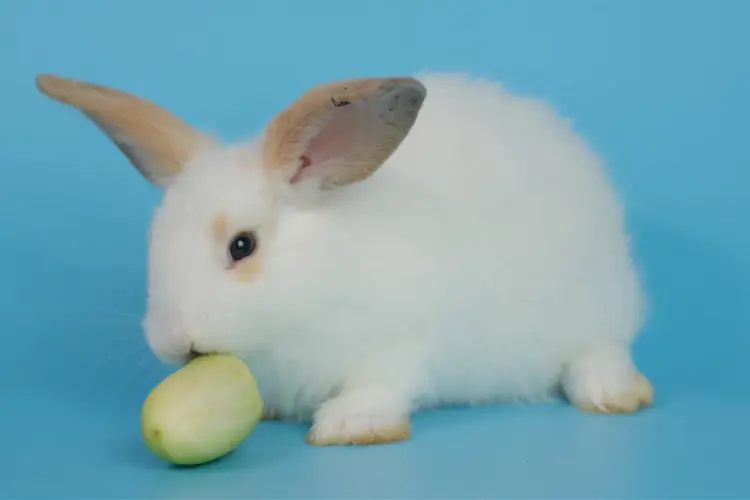
Cucumber Varieties and Preparation Tips
Numerous cucumber varieties exist, including:
Armenian cucumbers
English cucumbers
Lemon cucumbers
Persian cucumbers
While feeding cucumbers to rabbits, taking into account the cucumber type and correct preparation is key to guarantee safety and optimal nutrition.
Organic vs. Non-Organic Cucumbers
Organic cucumbers are preferred to reduce the risk of pesticide exposure, but non-organic cucumbers can be used if washed thoroughly. While both organic and non-organic cucumbers offer similar levels of minerals, vitamin C, and vitamin E, organic cucumbers may contain higher levels of:
Vitamin C
Iron
Magnesium
Phosphorus
When you eat cucumber, a type of fresh vegetables, you may notice a difference in taste and texture compared to non-organic cucumbers.
By choosing organic cucumbers or thoroughly washing non-organic ones, we can provide our rabbits with a safe, hydrating, and nutrient-rich treat.
Washing and Peeling Cucumbers
Prior to offering cucumbers to your rabbit, washing and peeling them to discard potential contaminants and bacteria is a necessity.
Cleaning non-organic cucumbers with cool, clean water can assist in removing dirt, germs, and some pesticide residues, albeit it must be emphasized that no washing method can entirely remove all pesticide residues.
By taking these steps, we can ensure that our rabbits enjoy the refreshing taste and benefits of cucumbers without any potential harm.

Foods to Avoid in a Rabbit’s Diet
Comprehending the role of cucumbers in a rabbit’s diet is important, and so is being cognizant of foods that must be avoided due to their toxic effects.
Certain foods, like rhubarb, iceberg lettuce, and allium vegetables (e.g., onions and garlic), can threaten rabbits and should be excluded from their diet.
By being mindful of these harmful foods, we can ensure our rabbits maintain a balanced, nutritious, and safe diet.
Cucumbers in the Context of a Balanced Rabbit Diet
Cucumbers can form a portion of a balanced rabbit diet, which should chiefly comprise:
Hay
Water
Greens
Vegetables
Fruits (served as occasional treats)
While cucumbers do provide hydration and some essential vitamins and fiber, they should not make up a substantial part of a rabbit’s diet.
By offering rabbit cucumber treats in moderation and ensuring the rest of their diet is well-rounded and nutritious, we can support our rabbit’s health and happiness.
Hay and Water
Hay is a crucial element of a rabbit’s diet, which should be supplied daily in unlimited amounts, as it forms around 80-85% of their diet. Timothy hay is the most popular and recommended for rabbits, though meadow hay and orchard grass are also viable alternatives.
In addition to hay, clean and fresh water should always be available for pet rabbits to support their overall health and wellbeing.
Greens and Vegetables
Greens and vegetables are significant in a rabbit’s diet, delivering essential nutrients, fiber, and hydration. Offering a diverse range of appropriate greens and vegetables daily is important. Some examples include:
Parsley
Mustard greens
Spinach
Broccoli
Green peppers
Brussels sprouts
Introduce new greens gradually and in moderation to avoid digestive distress, and maintain a balanced diet to ensure your rabbit’s digestive system and overall health.
Fruits as Occasional Treats
Fruits can be included in a rabbit’s diet as sporadic treats, typically 1-2 tablespoons daily or once or twice a week. Some suitable fruits for rabbits include:
Apples
Pears
Bananas
Strawberries
Blueberries
Raspberries
Melons
Ensure to discard the seeds and pits of these fruits before feeding them to your rabbit, as they may contain cyanide.
By providing fruits as occasional treats, we can add variety and enjoyment to our rabbit’s diet while still ensuring optimal health.
Frequently Asked Questions
What vegetables can rabbits eat daily?
Rabbits should be given an adult-sized handful of washed leafy green vegetables, herbs and weeds daily.
Good options to provide are cabbage, kale, broccoli, parsley, mint, bell peppers, bok choy, Brussels sprouts, carrot tops, cucumber, endive, escarole and fennel. Introduce new types gradually, in small amounts, to avoid potential stomach upsets.
What vegetables can rabbits not eat?
Rabbits should avoid vegetables such as iceberg lettuce, silverbeet, jicama, potato and tomato tops, ragwort, rhubarb leaves, and avocado due to their potential toxicity and low nutritional value.
Additionally, they should steer clear of fruit seeds, pits, raw onions, leeks, garlic, meat, eggs, dairy, broad beans, kidney beans, and jasmine.
Can rabbits eat tomatoes and cucumbers?
Yes, rabbits can eat tomatoes and cucumbers as they are a natural part of their diet, typically found in farms and other rural areas. Fruits and vegetables make up a good snack or full meal for pet rabbits in addition to pelletized and packaged feeds.
What does a rabbit eat?
Rabbits should be fed mostly hay, grass and fresh vegetables, supplemented with a small amount of pellets according to their body weight. Additionally, they should always have access to clean drinking water for optimal health.
How often should I feed cucumbers to my rabbit?
It is recommended to feed cucumbers to your rabbit two to three times a week in moderation.
So, Can Rabbits Eat Cucumbers?
Cucumbers can be a safe and hydrating treat for rabbits in moderation and as part of a balanced diet.
By understanding the nutritional benefits and potential health concerns of cucumber consumption, proper preparation techniques and age considerations, we can ensure that our rabbits enjoy a refreshing, healthy, and satisfying diet.

